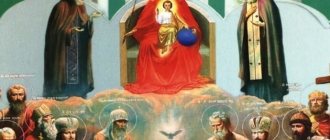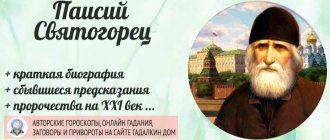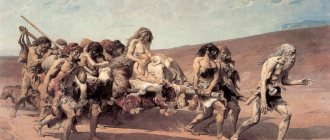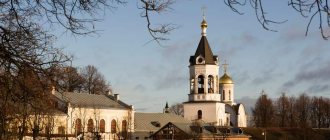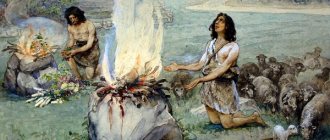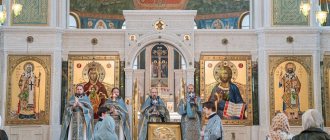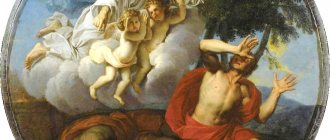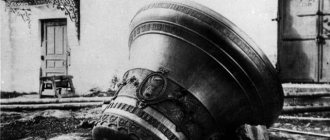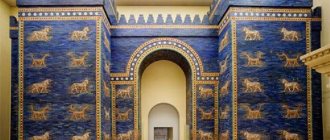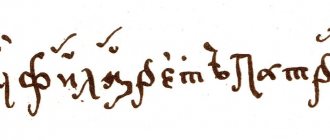Monk Abel is one of the iconic figures of the late 18th and early 19th centuries, and many of his predictions are still relevant today. The topic of our material today is the predictions of Monk Abel about Russia and the future of the whole world in the 21st century. On the eve of each New Year, people remember with interest the prophecies of famous seers of all times. And although not many of the holy elder’s predictions have survived to this day, they still make it possible to reveal some of the secrets of the future and understand what awaits us in 2022 of the Water Tiger.
2022 Monk Abel: prophecies and predictions of the monk about the future of Russia in the 21st century.
Who is Monk Abel?
They say that there are no prophets in their own country. It is not true. Throughout the history of the Russian land, there were people to whom more was revealed than to mere mortals. They were called differently: spirit seers, saints, holy fools, people of God. They all had sincere faith in the Lord in their hearts and lived according to his commandments. Perhaps it was she who gave them indestructible strength and they were not afraid to tell the dangerous truth to the powers that be, although in Russia this has always been a very risky endeavor...
Some of them were given a lot: Sergius of Radonezh, John of Shanghai, Seraphim of Sarov, Ksenia of Petersburg, Matrona of Moscow - all of them were deeply religious people and had the gift of foreseeing the future.
Monk Abel is an absolutely real person who lived at the turn of the 18th and 19th centuries. All his life, his faith and abilities contradicted each other, which is why the elder suffered a lot. By the time of his death, the gift of clairvoyance was beyond Abel’s strength. Most of his predictions were not forgotten over time and almost all of them have survived to this day.
Before plunging into the world of this amazing man’s predictions, let’s try to learn more about his own life.
Biography
The wanderings of the monk Abel around the world.
Abel was able to predict many significant events of his time, and some of the prophecies of the monk Abel about the future of Russia also apply to our time. His predictions were very disliked by the powers that be; for every accurate prophecy, the authorities sent the daring monk to prison, so Abel’s biography is better read than any other historical novel.
- Childhood. Abel, from birth Vasily Vasiliev, was born on March 18, 1757 in a village near Tula, which belonged to Lev Naryshkin in an ordinary peasant family. As usually happened then, besides him, his parents had eight more children, so Vasily had to learn the profession of a carpenter from an early age. As soon as the young man grew up, he was sent to work in Kherson and Kremenchug. It was not easy for the boy in a foreign land, and one day he suffered from a serious illness. The young man survived only thanks to God's will. Therefore, after recovery, he decides to return to his family and ask his parents for their blessing to become a monk.
- Youth. The relatives did not even listen to the young Son. I had to earn money and help my brothers and sisters. As was customary then, at the age of 17, Vasily was forcibly married to one of the village girls.
- Maturity. More than ten years have passed. And Vasily, it would seem, accepted his fate and even had three children, but this was not at all the case. Having saved up money, he paid off the master and became free. And one night in 1785 he leaves his family and goes to the Valaam Monastery, where he takes monastic vows and becomes the monk Abel.
- Balaam. Thus, Abel began to live on the island of Valaam in solitude, fasting and prayer. It was during this period that he began to have visions of the future. According to legend, he, using the help of God, found an ancient manuscript that contained messages concerning our world. It was from this moment that the monk realized that his calling was to predict the future. Soon he leaves the monastery and wanders the world for nine years. Abel finds a new refuge in the Nikolo-Babaevsky Monastery. It was there that he began to write down his prophecies in a special notebook, which later brought him a lot of trouble and trouble.
- Prophecies and persecution. Perhaps the most eventful part of Abel’s life. Read about it further.
- Imprisonment and death. Many of the monk's predictions frightened people. Finally, on the orders of Nicholas I, Abel was imprisoned in the Spaso-Evfimiev Monastery in Suzdal, where he died on November 29, 1841 at the age of 84. It is believed that he was able to foresee the date of his death 40 years before his death.
About Alexander II
“Your grandson, Alexander II, destined to be the Tsar-Liberator. He will fulfill your plan - he will free the peasants, and then he will beat the Turks and also give the Slavs freedom from the yoke of the infidel. The Jews will not forgive him for his great deeds, they will begin to hunt him, they will kill him in the middle of a clear day, in the capital of a loyal subject with the hands of renegades. Like you, he will seal the feat of his service with royal blood...”
Abel's prophecies and persecution
Abel was not happy with his gift, the ability to see the future was depressing, so until the end of his life he tried to avoid crowded places, preferring deserted monasteries. He was afraid to contact people and tried not to get close to anyone. Often the monk could not explain what he saw, so he resorted to comparisons and allegories. Many prophecies were compiled by the monk at the end of his life. Therefore, in addition to predictions, they contain the wisdom of a person with a difficult fate, who was not afraid to tell the truth even to emperors.
Catherine II
Literally: “...he will reign for 40 years...”
The prophecy was made in the Nikolo-Babaevsky monastery, where Abel writes his first book with predictions of the future, in which, among other things, he points to the death of Catherine the Second. In 1796 he showed his notes to the abbot. The scandal turned out to be huge, the church considered this prophecy to be blasphemy, he was stripped of his hair and handed over to the civil authorities. They, without thinking twice, put him in prison. The news of the seditious monk-fortuneteller reached Catherine herself, she took pity on him and ordered him to be imprisoned in the Shlisselburg fortress. And on November 17, 1796, the empress suddenly died, and everyone realized that Abel was right.
Paul I
Meeting of monk Abel and Paul the First.
Literally: “your reign will be short... I see your cruel end... you will suffer a painful death from unfaithful servants...”
After the death of Catherine II, her son Paul I, who strongly disliked his mother, ascended the throne. The new prosecutor general, sorting through the papers of the Synod, accidentally finds Abel's manuscripts and orders him to be taken to the capital. Moreover, he gets an audience with the new emperor, who forgives him, changes Abel’s sentence and sends him into exile in Kostroma.
There he immediately begins writing new prophecies, now about the current emperor, in which he predicts the circumstances of Paul's death. And everything was repeated all over again: the monk showed the predictions to the abbot, he informed the secular authorities, and Abel was arrested a second time. And in 1800 he was imprisoned in the Peter and Paul Fortress, where he remained until Paul’s death. Everything predicted by Abel came true; the emperor died as a result of a palace coup - March 12, 1801. After this, the monk was released from the fortress and sent into yet another exile...
Alexander I
Verbatim prediction: “...The French will burn Moscow down under him, and he will take Paris from them... and he himself will be called the Blessed One. Secret sorrow will be unbearable for him... and the feat of royal service will be replaced by the feat of fasting and prayer...”
A monk with frightening abilities is sent to eternal exile in Solovki. However, this link does not discourage Abel from telling people what awaits them. And the fate of Russia in the 19th century, as we know, was not easy. In 1801, he describes the events of the Patriotic War of 1812, predicts the Battle of Borodino and the capture of Moscow by Napoleon.
The restless prophet is drawn to the attention of the current Russian Emperor Alexander I, who orders him to be sent to the inner prison of the monastery, where many important prisoners were kept. Abel spent ten years in this prison, just before the start of the war with the French and the capture of Moscow... After the prediction came true, the emperor had to release the monk after a personal meeting. Moreover, the Russian emperor ordered to provide him with documents, money, clothing and everything necessary. From this moment on, Abel’s “finest hour” begins; he ends up in St. Petersburg, where he becomes popular with the highest nobility of the empire. The monk travels freely around the country, making pilgrimages to Mount Athos and Jerusalem.
Nicholas I
Literally: “The beginning of Nicholas’ reign will begin with a fight, a Voltairian rebellion...”
After returning to his native land, Abel decides to stay in the Trinity-Sergius Lavra, but a few years later in 1823 he was forcibly sent to the Serpukhov Vysotsky Monastery. The monk escapes from there, which again attracts the attention of the Russian authorities. In 1826, he predicted the future for Nicholas I, who did not like it and this emperor already ordered the capture of the freedom-loving Abel.
Therefore, after another capture near Tula, the monk was imprisoned in the Spaso-Efimiev Monastery in Suzdal, where he died in 1841.
Nicholas II (Gatchina Casket)
Emperor Nicholas II arrives at the Gatchina Palace.
Literal prediction: “He will have the mind of Christ, long-suffering and purity... he will replace the royal crown with a crown of thorns... There will be war. A great war, a world war... and on the eve of victory the royal throne will collapse... the godless government will scourge Russia..."
It would seem that what connects Abel and the last emperor from the house of Romanov, who ascended the throne after the death of the monk. There is a legend that the manuscript containing the predictions of the monk Abel about the future of Russia and the reigning dynasty was sealed by the widow of Paul I in a special casket. And the casket is hidden in Gatchina, with instructions for descendants to open the casket and read the prophecy in 100 years.
It is believed that on March 12, 1901, Nicholas II and the Empress arrived at the palace to reveal the centuries-old secret of the dynasty. They rode cheerfully, as if on a holiday, but, apparently, Abel did not know how to make good predictions for the Romanov family. According to eyewitnesses, Nikolai returned to the capital very thoughtful and sad.
This manuscript has not survived to this day; information about it is only available in retellings, which differ greatly from each other. Believe it or not is your own business.
It was after reading the manuscript that Nicholas II began to call 1918 a fatal year for himself. And so it happened. In 1903, Nicholas was delivered the prophecies of another famous Russian predictor, Seraphim of Sarov; they say that after reading them, the emperor cried for a long time. It is possible that it was the prophecies read that forced the last Russian emperor to behave so passively during the critical days of the Russian turmoil.
But, unfortunately, it was not possible to change the course of history. Russia had to go through two world wars, turmoil, famine and rivers of blood. And the imperial family became only one of the first victims of this hard time. In his notes, Abel says: innumerable disasters will fall on the Russian people because they betrayed their king.
In his predictions, Abel said that out of the entire royal family, only one of the daughters, whom he called “resurrected” (translated from Greek Anastasia - “resurrected”), would be saved. For many years there were legends that it was Anastasia who was able to survive that night when the entire family of the abdicated emperor was shot. Whether this is true or not, the debate continues to this day.
Fact. Abel was not a martyr, did not suffer as a result of persecution for his faith, and therefore was not canonized by the Russian Orthodox Church. However, his truthful predictions still inspire awe.
About Paul I
“Your reign will be short, and I see, sinner, your cruel end. You will suffer martyrdom at the hands of Sophronius of Jerusalem from unfaithful servants; you will be strangled in your bedchamber by the villains whom you warm in your royal bosom. On Holy Saturday they will bury you... They, these villains, trying to justify their great sin of regicide, will declare you insane, will revile your good memory... But the Russian people with their truthful soul will understand and appreciate you and will carry their sorrows to your tomb, asking for your intercession and softening the hearts of the unrighteous and cruel. The number of your years is like counting beech trees.”
The prediction that the Russian people will appreciate Paul I has not yet come true. If today we were to conduct a survey about the attitude of Russians towards past autocrats, Pavel would certainly be one of the outsiders.
Predictions for the 20th–21st centuries
The monk made many prophecies about our time during his life. Many of his words have already come true, but the attention of our contemporaries is focused on the coming 2022. There are legends that there is a whole collection containing Abel’s predictions about the future of Russia for hundreds of years. It was carefully preserved first by the Tsarist gendarmes, and then by the Soviet secret services; it is believed that it was this one that was shown to Emperor Nicholas II.
Events before the collapse of the USSR
Most likely, it was Lenin who Abel called “The Second Vladimir.”
A lot of texts with prophecies appear immediately after the collapse of the USSR. All of them concerned our time, we present them in chronological order:
- Revolution and Lenin. “... A bald man with an ax, who will be placed in a crystal coffin... he will scourge the Russian Land, plunder its Shrines, close churches and temples, execute Russian people.”
- The Great Patriotic War. “... the new Batu in the West will raise his head... the Russian people will rise, but Batu will collapse, he will not stand it.”
- Collapse of the USSR. “After 70 years of desolation, demons will leave Russia. Those who remain will dress up in sheep’s disguises, while remaining predatory wolves.”
- Boris Yeltsin. “A second Boris the giant will appear in Rus', the country will be on the verge of collapse, and under the guise of a revival of its former greatness, he will destroy the latter. The giant will wander through the labyrinth for a long time. A short man with a black face will sit on his shoulders.”
Present time and future
Further predictions are more difficult to interpret; we will try to present them verbatim in chronological order. Interpretations are speculative
Putin. “The giant will bring him on the shoulders of a half-bald, half-hairy man... he will remain unknown for a long time, and then he will begin to play the role of a servant. He will change his appearance twice. Rus' will suffer great disasters from him... will die from a mortal wound... there will be two wars on the Promethean Mountains... a crescent moon will appear there, and the third Tauride War, torn Taurida will bleed. And also a three-time climb up the mountain...”
Yes, indeed, many details coincide: Boris Yeltsin was tall, it was he who brought Putin, who can really be called “half hairy,” to power. However, the text says that this man comes from a southern city, and Putin, as is known, was born in St. Petersburg. Everything is clear with the Promethean Mountains - we are talking about the Chechen wars. The Tauride War is, apparently, the Crimean War, but why a third? Climbing the mountain three times is perhaps a threefold, but short-lived jubilation for Russia. Let’s say the first rise is the return of Crimea, what will happen second and third is unclear. Will die from a wound - hints at Putin's violent and unexpected death.
Putin's successor. “And then they will place a foolish young man on the throne, but soon he and his retinue will be declared impostors and driven out.”
Apparently, it is implied that after Putin's death, a certain young impostor will become the head of state.
The first king. “And the most terrible for Rus' ten kings for an hour, thirty tyrants for an hour will come: a man with a helmet and visor, does not reveal his face, a faceless sword-bearer, clad in chain mail, shedding blood. He is from the swamp, and his eyes are green, he will be in power when his two A's come together. He will fall, but again rise to the heights and begin to take revenge on everyone for humiliation. They won’t be able to bring him down for a long time, but then he will be thrown into the abyss.”
Next, a time of unrest will begin and the rulers of Russia will change very quickly. It is difficult to draw conclusions and understand who Monk Abel means in this case.
Second king. “The other (second) long-nosed one will be hated by everyone, but will rally great strength around himself. A man sitting on two thrones will seduce five more of the same kind, but on the fourth rung of the ladder they will fall ingloriously.”
Third king. “A man with unclean skin. He will be half bald and half hairy."
The fourth king. “The Marked One will flash like a meteor and the Lame One will replace him.”
Fifth king. “The lame and crippled will fearfully cling to power.”
Sixth king (queen). “Then the Big Lady with golden hair will bring three golden chariots.”
We did not find information about the other four kings.
World events
These predictions most likely date back to the late 21st or early 22nd century.
The beginning of the World War. “In the very south of the black Arab kingdom a leader in a blue turban will appear. He will throw lightning and turn many countries into ashes. There will be a great, exhausting war of the cross and the crescent, in which the Moors will intervene, lasting 15 years.”
It is clear that we are talking about a serious religious war, but at the moment it is unclear which Eastern country will be strong enough to rally all Muslims around itself.
“Carthage will be destroyed, which will be resurrected and the prince of Carthage will be the third pillar of the unification of the armies of the Crescent. There will be three waves in this war – back and forth.”
Great ruler. “When terrible death threatens everyone, he will come, the Swift Sovereign, the Great Horseman, the short-ruling Great Potter. He will be pure in soul and thoughts and will bring down his sword on robbers and thieves. No one will escape reprisal or shame.”
It is not entirely clear what the Great Potter will rule: Russia or the whole world. Another thing is that it is unclear how he will be able to restore order in a short period of rule.
Court of the Boyars of the Great Ruler.
“Five boyars close to the Tsar will be put on trial. First boyar, judge. The second boyar is fleeing abroad and will be caught there. The third will be the governor. The fourth one will be red. The fifth boyar will be found dead in his bed.”
Great update.
“The Great Renewal will begin. In Rus' there will be great joy in the return of the crown and the acceptance of the entire large tree under the crown. The three branches of the tree will merge together after the flight of the demons and there will be a single tree. Then Russia will be great, throwing off the godless yoke.”
When will Russia have a new ruler?
Quite an interesting video with the prophecies of Monk Abel.
Prediction of three Vladimirs
Maybe it was precisely this change in appearance that Abel meant.
Abel did not predict the exact name of the future ruler of Russia, however, there is one prediction that may well suggest an idea.
“The greatness of the country will be restored by a man whose name thundered three times in the history of Russia...”
So, the monk spoke about a man whose name is inscribed three times in the history of our state, about a man of high origin, perhaps even of royal blood.
- Some researchers consider this to be an indication of the names Alexander and Peter, because sovereigns with such names ascended to the Russian throne three times.
- There is another opinion that we are talking about Vladimir. According to this version: the first is Vladimir Krasno Solnyshko, the second is Vladimir Lenin, the third is Vladimir Putin.
Abel's prophecies about the future of Russia are somewhat vague and inconsistent, and it is impossible to say for sure whether the current 21st century will be a turning point in the fate of our state.
End of the world
According to some versions, Abel’s predictions also contain information about the end of the world:
“And he will reign a thousand and fifty years, and at that time there will be 8400 years from Adam. And then the dead will rise and the living will be renewed, and there will be a solution for everyone and division for everyone...”
The text of the prophecy itself is quite clear and does not require additional explanation. The most interesting thing is the actual year of the end of the world. There are several versions of what year it is from the Nativity of Adam. On average, we now live in approximately 7600, respectively, the end of the world, according to Abel, awaits us in 800 years, that is, approximately in 2821 .
Global forecasts
Like other prophets, Abel had negative predictions for the world. Heavy cataclysms are coming, the monk mentioned this in his works. Strong winds will hit Europe, and the West will face flooding. Nature will rebel against humanity. Against the backdrop of negative natural conditions, problems with food and clean water supplies will begin.
There are many conflicts in the future. Neighboring countries become bitter towards each other. Abel’s opinion on this matter is unequivocal - such transformations will be the first prerequisite for the end of the world. In the future there will be no states or borders if the destruction of the world order is not stopped.
The difficult political situation will be replaced by worsening social conditions. Europeans will not be able to preserve fertile lands. Hunger will begin. In search of allies, Europe will turn to Russia for help, but will be refused. Conflict situations will prevail in eastern countries, which will worsen their situation.
The threat of the end of the world
Abel's negative predictions include a description of the end of the world. Like many prophets before the monk, he predicted the death of humanity in the distant future. The predictions from the monk Abel differ in their detail.
The elder said that the Earth itself would begin to reject people. Negative processes were launched a long time ago, and they are gradually being lost. The monk connected internal changes with external changes. He said that individuals would feel the inevitability of transformation.
Dire prophecies of cataclysms for Australia and island states. According to deciphered forecasts, such countries will be the first to suffer. After part of the earth goes under water, many peoples will begin to seek refuge. The struggle for natural resources will begin. Such forecasts from Abel have a strong negative connotation. Against the backdrop of a weakening moral component of the world, dark times will begin.
It will be difficult for European countries. Drought will begin in Africa, and Western countries will suffer from constant rainfall. Earthquakes will begin. According to the elder, this is how the Earth will try to get rid of its most terrible enemy - man. Every individual on the planet will be forced to decide what he can do to save himself and his family.

